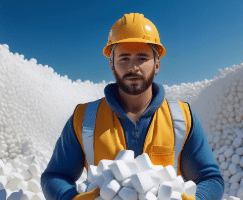
Polystyrene: lightweight, heavy waste
Seen as a remarkable step forward in protective packaging, polystyrene has been in commercial production since the 1930’s. Unfortunately, the process to manufacture polystyrene is one of the largest sources of hazardous waste in Australia! In fact, polystyrene foam contains chemicals linked to a diverse range of negative health impacts including impaired memory, nervous system damage, hearing and vision loss, and cancer.
In construction
Polystyrene is ubiquitous throughout the construction and demolition industries. Used in packaging, cladding, refrigerators and shipping boxes, it is also widely used in sheet form as insulation for walls, floors and ceilings. As a waste product, the safe and ethical disposal of polystyrene is challenging but it is something that we as an industry have a moral obligation to address.
Disposal of polystyrene
Polystyrene is a toxic and hazardous waste substance. Made from styrene monomer, a liquid petrochemical, it does not break down and it cannot be burned, as this releases toxic gases into the atmosphere. In landfill, toxic chemicals can leach into water sources affecting aquatic organisms. In the environment, mammals, seabirds and turtles can eat the foam, mistaking it for food, resulting in choking, digestive problems and starvation.
Over 60 countries have banned polystyrene but Australia has been dragging its feet. The Albanese government is pushing ahead with plans to regulate standards for packaging by 2025 – increasing the use of recycled materials and the amount of packaging that is recycled. Phasing out polystyrene altogether has proved problematic, with the packaging industry claiming there are currently no viable alternatives.
Recommendations
It is a stark reality that until it starts being economically unviable, many manufacturers will continue to use polystyrene in their packaging. As an industry, it is up to us to leverage our buying power to influence positive change. SKIPZ Recycling strongly recommend that builders speak to their suppliers about the packaging they use to transit whitegoods, appliances and other products. There are environmentally responsible alternatives including recycled corrugated cardboard and shredded recycled paper.
SKIPZ can provide our clients with on-site, dedicated bins for clean polystyrene (uncontaminated by other building and waste products) and through our relationship with Foamex in Bayswater, discarded polystyrene is processed back into sustainable building materials such as insultation.
Let’s work together to make our vision of a greener, cleaner world a reality – one skip at a time.
